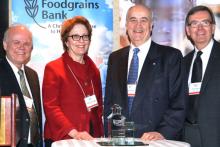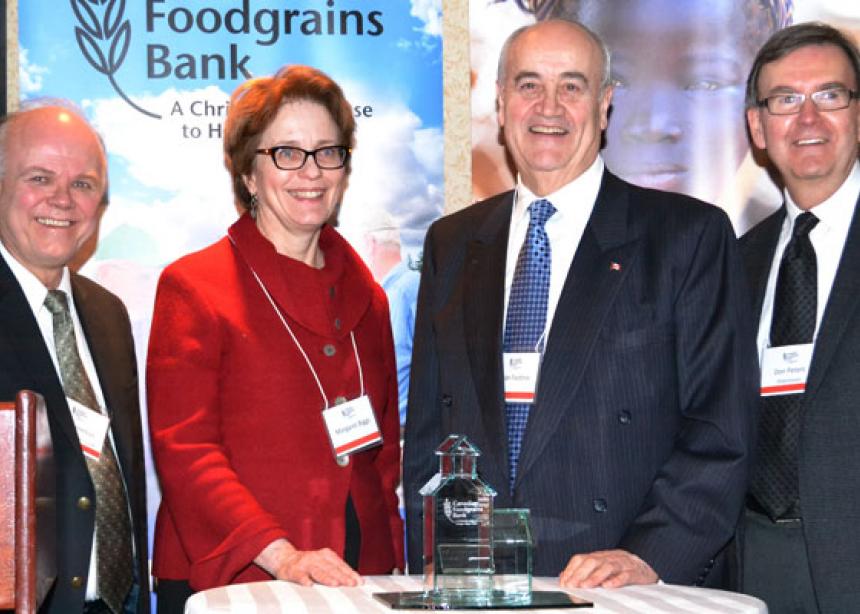Helping people in need overseas is not only a “tangible expression of Canadian values,” but also a “critical instrument for advancing Canada’s long-term prosperity and security.”
That’s according to the March federal budget, in which the federal government announced that its main foreign aid body, the Canadian International Development Agency (CIDA), will be folded into the Department of Foreign Affairs and International Trade, a department that manages the country’s diplomatic affairs and advances Canadian economic interests abroad.
CIDA has long been a major funder of faith-based development organizations like Mennonite Central Committee (MCC) and Canadian Foodgrains Bank (CFGB).
The move surprised few in the development sector, as Conservative and Liberal governments alike have long talked about achieving “policy coherence” with respect to development, defence, diplomacy and trade.
Jim Cornelius, who heads the Foodgrains Bank, said the move could give aid a higher profile within government or it could result in other departmental priorities outcompeting aid for funding. Cornelius believes, however, that aid could be delivered effectively under the new arrangement. It all depends on how the new arrangement unfolds.
The Foodgrains Bank is three years into a five-year, $125-million funding arrangement with CIDA. That funding will not be affected by the changes.
Julian Fantino, the minister responsible for CIDA, has called the Foodgrains Bank the government’s “primary Canadian partner for international food assistance.”
“The concern we have,” said Cornelius, “is the degree to which the aid programs give primacy to the reduction of poverty.” The focus should not be Canadian prosperity or security, he said, although those could be natural bi-products of certain development programs.
When asked how Foodgrains Bank donors might feel about government language that frames aid as serving Canada’s own interests, Cornelius said donors have a “deep concern about people who they know are suffering.” Donors give out of love for people, he said, without expecting anything in return.
Cornelius said donors wouldn’t necessarily oppose other goals—noting that a world with less poverty and inequity will be more secure and generally prosperous—but Canada’s interests should not be the “driver” behind its actions.
The move comes at a time when nervousness and uncertainty have settled over the Canadian development sector, with some organizations feeling their government funding may be cut if they are seen to oppose government priorities, including international trade priorities.
“The fact is, our work is going to go on,” said Don Peters, executive director of Mennonite Central Committee (MCC) Canada. MCC currently receives relatively minimal CIDA funding, as its most recent request was denied.
While Peters said some people in the sector fear that development will now be “trumped” by foreign affairs and trade agendas, he hopes the opposite might happen, that policy coherence could translate into a strengthened commitment to the poor.
MCC will continue to apply for government funding but only, Peters emphasized, when government programming, whichever department it is based in, matches MCC priorities. The bedrock of MCC will continue to be the “large group of faithful donors and volunteers.”
At the head office of Mennonite Economic Development Associates (MEDA) in Waterloo, Ont., president Allan Sauder remains “optimistic” about the government’s development programming.
CIDA funding for MEDA has remained relatively constant in recent years, at more than $6 million annually, making up about 20 percent of the organization’s budget. Fantino visited a MEDA project in Ethiopia earlier this year.
Sauder is comfortable with the government’s desire to create strategic linkages between development and trade. “We welcome more voices around the table,” he said, referring to “government, industry, business leaders and partners from around the world.”
“Business relationships can be very powerful” in creating sustainable livelihoods for the poor, Sauder said. MEDA would even be open to controversial trilateral-style arrangements that have seen CIDA partner with development organizations and large Canadian mining companies overseas.
Like others, though, Sauder said it is too soon to know what the repositioning of CIDA will mean.
What is known, and what hasn’t changed, is a continued slide in Canada’s overall financial commitment to assisting vulnerable people abroad.
Cornelius noted that Canadian “levels of [official government] aid as a share of economic output are slipping, rather than moving toward the internationally agreed target of 0.7 percent [of gross national income].”
Unlike the United Kingdom, which recently adopted the 0.7 percent target despite austere times, Canada’s commitment is expected to dip below 0.3 percent in the coming year. Regardless of which arm of government administers that money, Cornelius would like to see the figure rise.

Jim Cornelius, left, Foodgrains Bank executive director, presents a glass grain elevator—an “image of what the Foodgrains Bank has stood for and meant across the country”—to CIDA president Margaret Biggs and Julian Fantino, federal international cooperation minister. At right is Don Peters, the Foodgrains Bank’s board chair.


Add new comment
Canadian Mennonite invites comments and encourages constructive discussion about our content. Actual full names (first and last) are required. Comments are moderated and may be edited. They will not appear online until approved and will be posted during business hours. Some comments may be reproduced in print.